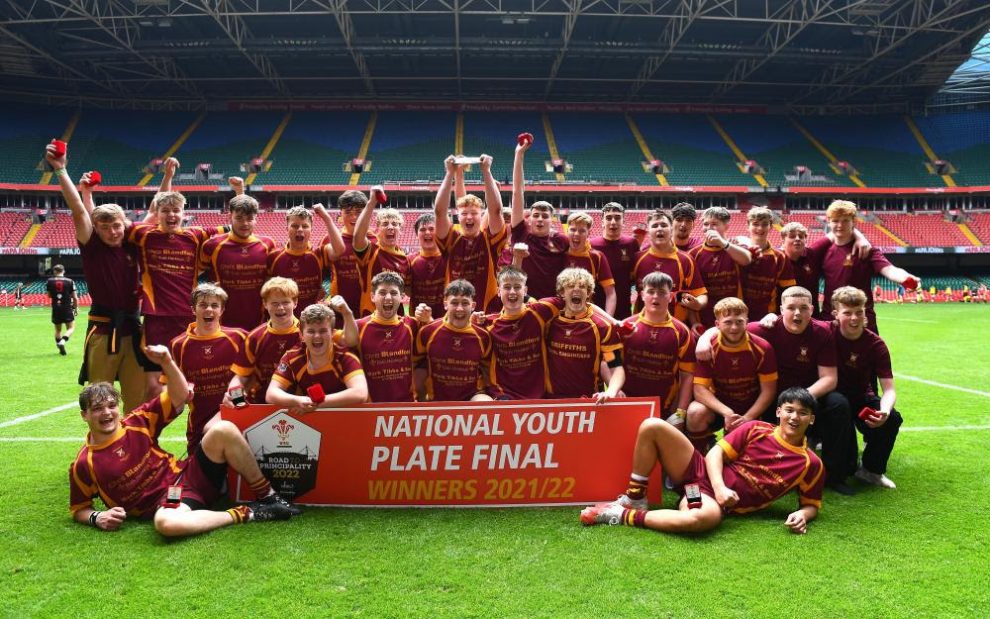THE Welsh Rugby Union has made the progressive decision to shorten the age range for a youth rugby side in Wales from three years to two – bringing the traditional upper age limit at this level down a year from Under-19 to Under-18 – for a minimum term of the next four years.
Historically the age range for the youth game in Wales has spanned from 16 to 19-years-old, meaning players aged 19 and under were eligible to play alongside and against players who may be due to turn 17 in their current school year.
Partly due to the Welsh Government’s pandemic regulations, which allowed an early return to play for children (U18s) this season and fewer restrictions, but also in direct alignment with the WRU Community Department’s strategy for retaining young players in the game, Youth Rugby has already played a year under the shortened age-range during 2020/21.
And, after a WRU Community Game Board (CGB) ruling last week, which rubber stamped the WRU’s new community player pathway strategy, the change will now be made permanently until at least 2026.
“Of course we will continue to monitor and review the effects of these changes, but I speak with absolute conviction when I say we believe this is a watershed moment for Welsh rugby,” said WRU community director Geraint John.
“This move is part of a much wider strategy objective to link up all the strands of our pathway. To increase the percentage of male players that transition from U16s into Youth Rugby and, in turn, increase the percentage of youth players who are retained in Adult Senior rugby.
“The collective aim we all strive for, is a vibrant and flourishing production line of committed and competitive talent coming through to the senior adult male game.
“We have done our research and discussed widely with players, clubs, coaches, administrators and all interested parties throughout the game. We surveyed over 9,000 individuals associated with Welsh rugby, both on and off the field including making direct contact with those involved in the current U16 junior, youth and senior adult male game in Wales and our overwhelming conclusion has been that the numbers don’t lie.
“Our participation figures and the comparisons each year, with each age group, show starkly that the choking point for our pathway is the year after U16 level, the first year of Youth Rugby.
“This is where players are lost to the game in their many hundreds and the research confirms what many of us have long suspected, that it is the sudden widening of age-banding which is part of the problem.
“There are of course fluctuations in player retention in other age groups, but between U7s and U16s, where single age banding is in place, player numbers in each age group remain strong.
“There are still holes in the bucket elsewhere and our work is by no means done, but it is in this first year of Youth Rugby where we have the opportunity to put our hands on the tap and significantly increase the flow of players coming through.”
The knock-on effect of limiting youth teams to a two year age range of 16-18 means that 19-year-old players will now enter the adult male game directly a year earlier than they may previously have done.
But John is keen to point out the WRU ethos of ‘enabling Welsh rugby to thrive at all levels’ still very much stands and the decision taken remains fundamentally about protecting and enhancing growth in the male community pathway, meaning more players are retained at all levels of the game.
“Our utopia would be single banding, with separate teams running through clubs at U16s, U17s and U18s level,” said John.
“To achieve that we need more young people playing in Wales and, most importantly, we need to keep them playing. We believe the game will be re-invigorated by this decision from the CGB to such an extent that this utopia could be possible in three or four years’ time.
“We know it’s tough on those players in the community game who are entering what would have been their final year of the Youth Rugby. We are acutely aware that, for an 18-year-old now they must prepare to enter the adult game, but we are wholeheartedly encouraging clubs to do all they can to retain these players too.
“Hopefully clubs will begin to flood their second or potential third teams with these players, if they don’t feel they are ready to step up to senior first team level, and we think, in the long term, this may be a common theme for the second team game in Wales.
“We will be doing all that we can to help support clubs in retaining these players and transitioning them through into the adult game.
“It’s been a tough decision, but there is a bigger picture to consider. In the past we have lost players to the game in their hundreds when they jump straight to U19 from U16 level in an average year, but last year actually saw an increase in players registering in the new U16 to U18 banding.
“We know this can be for a variety of reasons, but we are dealing with the one we can affect most directly. If we can improve retention in the first year of Youth Rugby we can open up the tap on protecting the male pathway in a way that will pay genuine dividends for years to come.”
A new digital registration system, an extensive survey of the community game and wide consultation with significant stakeholders throughout the game provided support information upon which the WRU CGB’s decision has been based.
Live data shows Welsh rugby has up to 15,000 male adult players registered each season, but the number of players who are committed and active on a weekly basis is smaller.
In a non-pandemic season 99% of first team fixtures are completed throughout the community game and Welsh rugby needs to continue to support high numbers of committed and competitive players in order to ensure this continues. But in order to continue to sustain second and third team fixtures the participation figures also need to grow even further.
The WRU has identified that this growth needs to happen at Youth Rugby level, as this is where the committed and competitive players come from.
“We know we need to increase committed and competitive players to sustain competitive first and second team fixtures,” added John.
“Youth players can provide the stability to the adult game in the long term and also make second and third teams both sustainable and competitive.
“We make no apologies for stating that our absolute focus at this time is on retention at that first season of Youth Rugby. We can’t fix everything at once but by doing this we know we are going to have a long term positive effect on the whole game.
“Our surveys in the youth game tell us that 16-year-olds are committed to represent their clubs, want to remain with the friendship group in a two-year banding and they want competitive rugby.
“The new banding structure should give them what they want and also aligns our male pathway with the female pathway, drawing a line between the community game and the performance game, as well as mirroring the youth age banding of the majority of rugby nations globally.
“We will be more joined up and more targeted in our retention, we are hugely positive about this latest move and we are absolutely determined that it will work to the betterment of the game at all levels.
“By the end of the four year period we have committed to, if the numbers stack up in the way we expect, we could have doubled the number of players graduating from youth level and entering the adult game.
“That can only be good for everyone in Welsh rugby.”

















